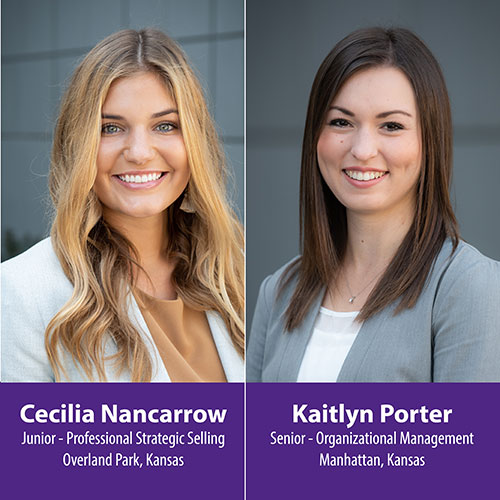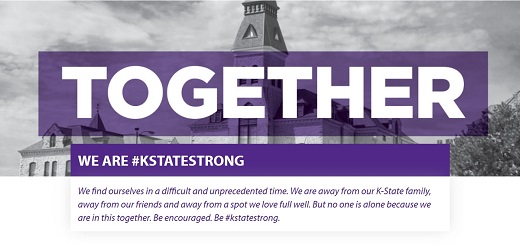04/01/20
K-State Current - April 1, 2020
K-State Current is a weekly news update for the Kansas Board of Regents to apprise the Regents on a few of the many successes and achievements made by K-State faculty, staff and students. 
K-State News
Visit K-State’s “We Are #KStateStrong” site to view brief videos designed to keep the K-State family engaged, connected and inspired during these challenging times.
Kansas State University earns five stars in worldwide university rating system
 Kansas State University recently earned a five-star rating in the QS Stars, or Quacquarelli Symonds, world rating analysis.
Kansas State University recently earned a five-star rating in the QS Stars, or Quacquarelli Symonds, world rating analysis.
The agency audits and rates universities worldwide. Each QS Star-rated university is listed at topuniversities.com, where students can filter by Star ratings. According to QS, universities that display exceptional performance and quality standards are awarded a five-star rating.
Grant Chapman, associate provost for international programs, said QS is a choice reference for international students, scholars and other global interests for evaluating institutions on a world scale. Students and their families not only look at rankings but at the more broadly-gauged comparisons that they can filter by star rating.
"International students and sponsors have many options to choose from, not only within the U.S. but worldwide," Chapman said. "The five-star rating is important for Kansas State University particularly when it comes to international reputation, especially with international students, partners, sponsors and funding agencies. The use of global rankings as a reference and stars ratings provide a comparison at a deeper level."
QS Stars is an opt-in audit opportunity for institutions to show greater depth and breadth than can be demonstrated in more typical rankings criteria that commonly include publication and citation numbers, student/teacher ratios, number of doctoral degrees conferred, among others. While these criteria are included in the ratings, they are accompanied by criteria evaluation that drill down more deeply.
In addition to the overall rating, K-State earned the highest five-star rating in all submitted areas.
Core areas:
- Teaching.
- Employability.
- Research.
- Internationalization.
- Facilities, including many areas such as sporting provisions, accommodation, IT infrastructure, libraries, medical support on campus and student societies.
Advanced criteria areas:
- Arts and culture.
- Innovation, which includes patents, industrial research and spin-off companies.
Specialist criteria category:
- Agriculture and forestry.
K-State also ranked in the top 50 in the world for agriculture and forestry.
"The five-star QS rating means that an external international organization has looked at tangible evidence supporting the academic and research quality as well as the overall learning environment at Kansas State University," Chapman said. "The standards are set at the highest international level and assist K-State as we strive to be a truly global university."
The Office of International Programs spearheaded the report which took six months to complete. The comprehensive Stars audit included just under 100 data points, with several hundred evidence requirements, Chapman said.
Many faculty, staff and administrators including the president and provost’s offices, colleges, departments and other academic and nonacademic units submitted data and other information such as photos, video footage, plans and lists.
"This was a very large undertaking and we thank our many partners across the university," Chapman said. "Without the good will and cooperation of the campus community, it would not have been possible to provide the detailed level of evidence required for all areas."
The honor is designated by QS Stars badges on webpages. Read more and view all of the Stars badges.
Contact Bev Earles, associate director of planning and analysis, Office of International Programs, for more information at earles@k-state.edu.
College of Education's Rural Education Center creates network to serve rural schools
 The Rural Education Center, housed in the Kansas State University College of Education, has recently established a Rural Professional Development School network to help address rural schools' most pressing needs, provide a forum to share best practices, explore grant opportunities and highlight accomplishments.
The Rural Education Center, housed in the Kansas State University College of Education, has recently established a Rural Professional Development School network to help address rural schools' most pressing needs, provide a forum to share best practices, explore grant opportunities and highlight accomplishments.
Eight districts have joined the initial effort to date and all are part of the Kansas State Department of Education's school redesign project: Ashland USD 220; Clay County USD 379; Dighton USD 482; Haviland USD 474; Lakin USD 215; Liberal USD 480; Pratt Skyline USD 438; and Twin Valley USD 240, which serves Bennington and Tescott.
Drawing on its award-winning Professional Development School model with school districts in the Manhattan area, the rural network provides a collaborative forum designed specifically for rural schools.
"Our faculty has taken the greatest strengths of our existing model, reimagined it for rural schools and attracted partnering districts with education leaders who have an uncompromising commitment to their communities and students," said Debbie Mercer, dean of the College of Education. "This is innovation at its finest."
Todd Goodson, professor and chair of the department of curriculum and instruction, believes it affirms K-State's mission.
"As a land-grant institution, our job is to reach as many Kansans as possible," Goodson said. "With the use of technology and a real-time understanding of the needs in rural schools, we can be more effective at enhancing learning opportunities for teachers and students in ways that are both practical and meaningful."
The seeds for the Rural Professional Development School network were sewn when representatives from the partnering rural districts met following the center's inaugural Rural Education Summit last summer on the K-State campus.
J. Spencer Clark, Rural Education Center director and associate professor of curriculum and instruction, said communication plays a key factor in the new network.
"The Rural Professional School Development network provides a two-way system to keep both the center and the districts informed about ways we can help each other meet the needs of our students," he said. "We're excited to have a strong group of districts in this partnership to help us identify issues and challenges and collectively create solutions tailormade for each district and community."
Kelly Arnberger, Dighton USD 482 superintendent and Dighton Elementary School principal, said he's looking to broaden educational opportunities and experiences for his students.
"Our work to transform learning for the students at Dighton USD 482 is catalyzed with our partnership with Kansas State University," Arnberger said. "At the end of the day, it is about options, and we look forward to providing more options for our students through our work with K-State."
Districts in the Rural Professional School Development network are already benefiting from the Rural Education Center's recent grant. Thanks to the Teaching Rural Students STEM through Tele-Presence national grant, robots will bring more learning opportunities to rural schools. The center received a $146,031 award to create a distance learning network to serve rural schools with an emphasis on science, technology, engineering and math.
Entering its fifth decade, the Rural Education Center was previously known as the Center for Rural Education and Small Schools. It is led by Clark and Lori Goodson, assistant director and an assistant professor of curriculum and instruction.
Approved by the Kansas Board of Regents in 1978, the center focuses on meeting the needs of rural schools in Kansas. It emphasizes advocacy for rural schools and their communities by pursuing grant opportunities and other sources of funding to support various rural educational projects. Clark and Goodson also plan to conduct research and coordinate various educational activities to support learning opportunities for rural students and teachers. The center is focused on supporting current curriculum initiatives and goals associated with the Kansas State Department of Education school redesign, STEAM education, place-based education, and civic engagement in rural schools.
For more information about Rural Professional School Development and other services of the center, email ruraled@k-state.edu.
K-State Faculty Highlights
Hospitality management professor selected to serve as member of hospitality accreditation commission
 Kevin Roberts, professor of hospitality management, has been selected to serve on the Accreditation Commission for Programs in Hospitality Administration, or ACPHA. The ACPHA is the accrediting group for all hospitality programs nationally and internationally. His three-year term will begin in July.
Kevin Roberts, professor of hospitality management, has been selected to serve on the Accreditation Commission for Programs in Hospitality Administration, or ACPHA. The ACPHA is the accrediting group for all hospitality programs nationally and internationally. His three-year term will begin in July.
ACPHA is a private, nonprofit body that is comprised of hospitality, tourism and business professionals from across the country. The ACPHA Commission consists of 11 commissioners, including hospitality educators, executives from the lodging, restaurant and hospitality industry and public-at-large members. Its composition ensures that the commission is completely independent and impartial. The main responsibility of the commission is to conduct the accreditation hearings to verify that those agencies applying for accreditation comply with the applicable standards. The commission members meet twice a year to review, assess and evaluate four-year and two-year hospitality programs at colleges and universities across the United States and throughout the world.
ACPHA standards set a national benchmark for the effective instruction of programs throughout the United States and across the word. The accreditation process requires three major efforts — a programmatic self-analysis, an evaluation by professional colleagues, and a review and decision by the commission. Through self-study, the applicant program uses the standards to analyze its effectiveness, strengths and weaknesses and to work toward improvement. At completion of the self-study period and submission of a self-study document, the program is visited by a team assembled by the commission staff. The evaluation team conducts a rigorous review of the program and then prepares a report which is submitted to the commission. Based on the program's self-study, the team report and the program's response to the report, the commission makes a decision whether or not to grant accreditation. Accreditation is generally granted for not more than seven years.
Roberts is a professor in the hospitality management department and directs the undergraduate program in hospitality management. He has 12 years of restaurant experience. Roberts teaches in the areas of food service management and hospitality law. He has been recognized for his outstanding teaching and has received the Kansas State University Presidential Award for Excellence in Undergraduate Teaching and the College of Human Ecology Myers-Alford Outstanding Teaching Award.
Roberts' research interests are related to the application of food safety principles in the commercial setting. His current research focuses on behavior change of employees once food safety training has taken place. He is interested in developing alternative food safety training programs that not only target knowledge, but the antecedents of behavioral intention.
Roberts also serves as director of the Center of Excellence for Food Safety Research in Child Nutrition Programs, is a member of the research committee of the School Nutrition Association and has completed several projects with the National Restaurant Association Educational Foundation.
Thompson-Laswell awarded Top Author Award by Top Hat

Katie Thompson-Laswell, senior instructor of human development and family science, was recently awarded the Top Author Award from Top Hat at its annual Engage user conference. This award is designed to recognize educators who have raised the bar to improve learning experiences for students before, during and after class.
The Top Author Award recognizes Thompson-Laswell's own interactive digital courseware for her human development classes through the Top Hat platform. Through the platform, she enables her students to engage with course materials in an effective way that facilitates mastery of the subject matter. She has developed a curriculum focused on interactive content, video, discussion questions and in-class engagement that is motivating, thoughtful and improves students learning. Through her course design and insightful instruction using the Top Hat platform, she supports students in building a strong foundation for success.
Thompson-Laswell was nominated for the award by her students.
"The way she presents the material in my human development class gives all students a chance for success now and in the future," said one of her nominators.
See the positive impact Thompson-Laswell has made on her students through this video.
Top Hat is education software built for professors and teaching faculty. It provides easy-to-use tools to engage the classroom, adopt and author next-generation interactive textbooks, create assignments and securely administer tests. More information on the platform can be found at tophat.com.
K-State Student News
 The K-State Sales Team competed in the National Collegiate Sales Competition, or NCSC, on March 27-30 through a virtual environment. With Gartner as the 2020 NCSC product sponsor, there were 68 universities and 133 competitors participating. The team took home the top honor in the individual competition and placed third overall in the competition.
The K-State Sales Team competed in the National Collegiate Sales Competition, or NCSC, on March 27-30 through a virtual environment. With Gartner as the 2020 NCSC product sponsor, there were 68 universities and 133 competitors participating. The team took home the top honor in the individual competition and placed third overall in the competition.
The NCSC is the longest-running university sales role-play competition in existence. It is also the most prominent sales role-play competition for college students who wish to pursue careers in professional sales, while providing students with unparalleled sales training. This event was moved from an in-person competition to a completely virtual environment due to the recent concerns of COVID-19. However, that didn't stop the NCSC team from organizing, once again, a spectacular event.
The K-State Sales Team had two students compete in the competition. The team consisted of Kaitlyn Porter, senior in organizational management, Manhattan; and Cecilia Nancarrow, junior in professional strategic selling, Overland Park.
Students competed in role-play scenarios selling Gartner to various industries. Each role-play was 20 minutes where students uncovered the needs of the prospect and sold them on the value Gartner could provide. Nancarrow placed first in the competition. Porter advanced to the quarterfinals, placing in the top 32.
"I want to thank Terry Loe, professor of marketing at Kennesaw State University and executive director of the National Collegiate Sales Competition, as well as Gartner and many others for still providing this opportunity for our students," said Kellie Jackson, managing director of the National Strategic Selling Institute and sales team coach. "It was great to see everyone transition to this new learning experience while remaining adaptable and flexible. Even though we couldn't attend or be together in person, I'm extremely proud of our students' efforts and celebrate their success with them."
The K-State Sales Team is in the College of Business Administration's National Strategic Selling Institute, which has been named one of the top sales programs in the country for eight straight years by the Sales Education Foundation. The team consists of students who are enrolled in the certificate or major in professional strategic selling. In fall 2018, Kansas State became just the 19th university in the U.S. to offer a major in professional strategic selling. Students can also earn a certificate in professional strategic selling, which is open to all majors at the university. The professional strategic selling program introduces students to the fundamentals of sales and through the innovative curriculum and sales labs allows students to develop the skills needed to be successful.
The K-State Sales Team will be competing in several competitions throughout the school year across the country. For more information on the National Strategic Selling Institute or the K-State Sales Team, please contact kstatesalesprogram@k-state.edu.
